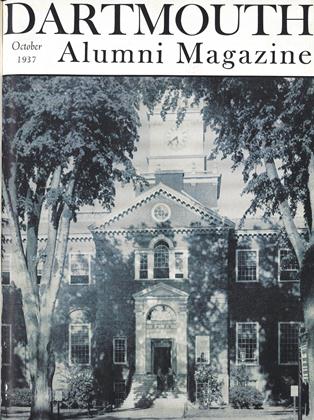IN 1934, B. H. Liddell Hart wrote the definitive book on Colonel T. E. Lawrence. The summer of 1937 ushered in two more books on the one undisputed genius produced by the First World War. S. C. Rolls in his Steel Chariots of the Desert (Cape, 1937) writes of the armoured cars which he drove in Libya and in Arabia with Lawrence. His portrait of Lawrence is that of a private soldier who idolized his officer. His is a good book not only because it throws interesting light on Lawrence but also because he writes entertainingly of mad dashes at seventy miles an hour across the sands of Arabia, and of the exciting fun he had blowing up bridges and railroad tracks with "Auruns": the one Englishman who had the unique training and character to lead the Arabs in a coherent force. The second book, T. E. Lawrence by His Friends (Cape, 1937), is a view of Lawrence by eighty different people who knew him from childhood to death. It is difficult to see why another book on Lawrence is needed for some time. At least two long narrative poems have recently been written with Lawrence as the central figure. More, I suppose, is known of Lawrence than any other man of the war. This is rightly so, for of all the leaders he has captured the imagination more than any other; possibly because he was the Hamlet of the Great War. To be or not to be was settled for him in May 1935 when he was thrown from his motor cycle at high speed, swerving to avoid hitting children, and dying within a week without regaining consciousness.
For this issue and the next I intend to comment on the books which Colonel Lawrence possessed in his cottage when he died. It is said that one can tell a great deal about a man from his personal library. This may be so, particularly if the library is owned by a man of keen literary discrimination. Lawrence was the author of the greatest prose work of our time: Seven Pillars of Wisdom. He was an astute literary critic as anyone knows who has seen his letters, and who knew the man. (His letters are now being edited.) A complete list of his gramaphone records, and of his books appears in the aforementioned book by his friends. Both reveal Lawrence; and both any man might be proud to own. I found the list of his books most interesting and I hope that my readers will feel the same way about it.
It is not within the province of these two articles to comment on all of the books and authors; indeed I have not the knowledge to do so, if I had the space at my disposal. However, I shall comment on those most interesting to me, and only on the books and authors that I have read, and in most instances, have in my own collection.
Henry Adams: The Degradation of theDemocratic Dogma, and The Education ofHenry Adams. Two books by an American historian; the first having the thesis that since the early days of our republic honesty and character in public life has steadily declined, the second a melancholy but vastly significant autobiography.
Aeschylus: Suffice it to say here that Lawrence, like most English university men, was a classical scholar and possessed the best of the classics both in the original and in translation. I shall not include the list of these in my article.
Conrad Aiken: his first book The Jig ofForslin. This distinguished novelist and poet is a member of the Harvard Class of 1911, but most of his classmates don't recall him. According to Laurence Winship of the Boston Globe he is probably its most eminent member; at any rate he is a first rate writer.
Richard Aldington: Death of a Hero. A first edition of this fine war book may be procured for as little as five shillings.
Sherwood Anderson: Horses and Men:Tales from Our American Life. Now a rural editor; the author of Wines burg,Ohio, and a book containing some of the finest short stories written since the turn of the century called The Triumph of theEgg
W. H. Auden: The Dance of Death, TheOrators, Poems. Poetry by one of the young, left wing poets of England. Has recently published a poem called Spain. (Also see "Suggestions.")
 View Full Issue
View Full Issue
More From This Issue
-
 Article
ArticleDartmouth Chapter of Phi Beta Kappa
October 1937 By LEON B. RICHARDSON '00 -
 Article
ArticleGradus Ad Parnassum
October 1937 By The Editor -
 Article
ArticlePresident Addresses College
October 1937 -
 Class Notes
Class NotesClass of 1921
October 1937 By Paul C. Belknap -
 Sports
SportsFollowing the Big Green Tearns
October 1937 By "Whitey" Fuller '37 -
 Class Notes
Class NotesClass of 1912
October 1937 By Conrad E. Snow
HERBERT F. WEST '22
-
 Books
BooksSHORT CUT TO TOKYO,
October 1943 By Herbert F. West '22 -
 Article
ArticleHanover Browsing
April 1946 By HERBERT F. WEST '22 -
 Article
ArticleHanover Browsing
February 1947 By HERBERT F. WEST '22 -
 Article
ArticleHanover Browsing
December 1947 By HERBERT F. WEST '22 -
 Article
ArticleHanover Browsing
May 1952 By HERBERT F. WEST '22 -
 Books
BooksTHE HONEST RAINMAKER.
April 1953 By Herbert F. West '22








